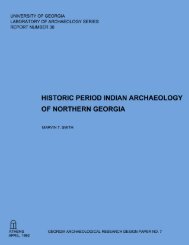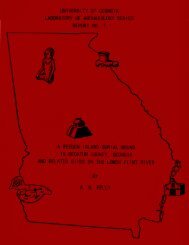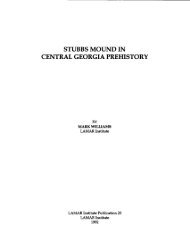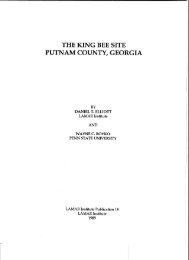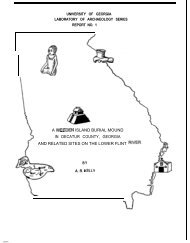Ye Pleasant Mount: 1989 1990 Excavations - Open site which ...
Ye Pleasant Mount: 1989 1990 Excavations - Open site which ...
Ye Pleasant Mount: 1989 1990 Excavations - Open site which ...
Create successful ePaper yourself
Turn your PDF publications into a flip-book with our unique Google optimized e-Paper software.
Ebenezer, he purposed to quit the water, having appointed some of our principal Indian<br />
Traders to wait his coming there, with a Number of Horses, as well as for sumpture as<br />
Riding: and also some of our Rangers to assist; intending from thence to travel on to the<br />
Creek Nation & c. (Stephens 1742, 2:67)<br />
The Detailed Reports of the Salzburgers at Ebenezer include numerous references to<br />
Yuchi and Creek Indians camping near their settlements. On March 28,1741, Bo1tzius<br />
reponed that a Yuchi family had been camping between Ebenezer and the plantations<br />
located to the south for one-half year (Jones 1985:123).<br />
A letter, dated June, 1751, from Governor Glen of South Carolina reponed the<br />
movement of the Yuchis away from the Savannah River region: "The Euchees whom you<br />
also mention, did in like manner till lately live in this Province at Silver Bluff, but being a<br />
Tribe belonging to the Lower Creeks, they were called Home, when they broke out war<br />
with the Cherokees." (McDowell 1958:170).<br />
Although most Yuchi had desened <strong>Mount</strong> <strong>Pleasant</strong> by 1740, their continued presence in<br />
the area is recorded until the late l750s. In September, 1756, eight European refugee<br />
familes from the Ogeechee area fled to <strong>Mount</strong> <strong>Pleasant</strong> following an Indian attack. As late<br />
as May, 1757, a few Indians remained near <strong>Mount</strong> <strong>Pleasant</strong>. William Moore, a resident of<br />
the <strong>Mount</strong> <strong>Pleasant</strong> vicinity, stated that there were "40 [Indian] gun men in his<br />
neighborhood near <strong>Mount</strong> <strong>Pleasant</strong> who were willing under his command" to aid the<br />
Chickasaw (CRG 7:206, 390, 549).<br />
Governor Glen's letter suggests that the Yuchi were no longer settled along the<br />
Savannah River by the 1750s, and had moved westward to join the Lower Creek tribes,<br />
most likely on the Flint and Chattahoochee Rivers. Their resilience as a people is proven<br />
by the survival ofthe Yuchi people, their language, and their culture into the present day, in<br />
Oklahoma (Speck 1909; Bauxer 1957; Rogers 1979).<br />
Other Yuchi Settlements. In addition to the Yuchi town at <strong>Mount</strong> <strong>Pleasant</strong>, several other<br />
Yuchi settlements have been documented in Georgia, Alabama, Tennessee, and South<br />
Carolina. In Tennessee, <strong>site</strong>s containing Mouse Creek type pottery tentatively have been<br />
identified as Yuchi, although some researchers disagree with this association. The best<br />
known of the eighteenth-century Yuchi towns is located on the Chattahoochee River in<br />
Russell County, Alabama. This also was one ofthe largest towns reponed (Ruscher 1958;<br />
Chase 1960; SchneI11982).<br />
The Chattahoochee River town reponedly was first settled by an old chiefof Cussetuh<br />
[Kasita] whom the English referred to as Captain EIlick. Captain EIIick married three<br />
Yuchi women and brought them to Kasita. The Kasitas were not pleased, as apparently the<br />
Creeks and Yuchi infrequently bonded in such fashion. Captain Ellick along with his<br />
11



